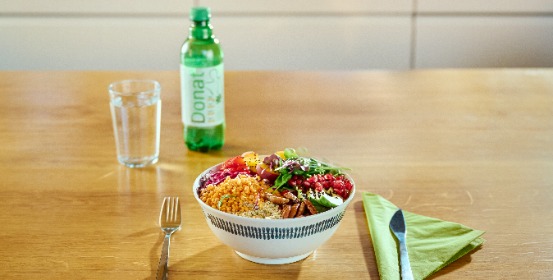A carefree holiday can quickly turn into a nightmare if you have to deal with digestive problems during your long-awaited trip. One of the most common problems when on vacation is constipation, which research shows can affect up to 40% of travellers.1,2 Constipation refers to difficult and irregular bowel movements, hard stools or a feeling of incomplete bowel emptying, all of which significantly affect your travel experience and increase discomfort. In addition to the above problems, constipation can also lead to other issues such as abdominal pain, nausea, bloating, as well as feelings of heaviness, tiredness and weakness, causing people to avoid exercise, skip meals and suffer other discomforts when away from home.3
One frequently asked question is: Why do we get constipated and experience unpleasant digestive symptoms when travelling?
There are many causes of travel constipation, including: changes in eating habits, reduced physical activity due to prolonged sitting, reduced fluid intake, changes in sleeping habits, exposure to stressful emotions, as well as postponing bowel movements and ignoring the need to go to the bathroom.
Changes in eating habits encompass a range of food-related travel behaviours, often accompanied by digestive problems. For example, skipping meals is very common when travelling, and has a negative impact on bowel motility, potentially resulting in fatigue, headaches, restlessness, lack of concentration and so on. A regular meal schedule before and during travel supports the digestive system and encourages the gut to trigger the bowel movement naturally, thus reducing the risk of constipation.
Resorting to fast food, snacks and processed foods is another characteristic of travelling, with the availability of such foods and our impulsive cravings overriding our established (and generally healthier) eating patterns. These foods contain more saturated fats and sugar, which are also associated with a higher risk of constipation.4 Although energy-dense, fast food, sweets, sandwiches and salty snacks do not constitute a nutritionally balanced meal, and by eating such foods when travelling we often neglect fruit, vegetables and wholegrain cereals, thus reducing our fibre and fluid intake. Dietary fibre is essential for normal bowel function: soluble fibres from fruit and vegetables (pectin) break down in water to form a gel-like structure that protects the entire digestive system and helps with stool formation, while insoluble fibres from wholegrain cereals (cellulose, hemicellulose and lignin) increase the volume of the stool, which facilitates bowel movements and reduces the risk of constipation. It is precisely this synergistic action of soluble and insoluble fibre that can be considered one of the main factors regulating bowel emptying, thereby reducing the risk of constipation when travelling, while also providing other benefits for health and overall quality-of-life.5
In order for our digestive system and all other body systems to function well, an adequate intake of fluids (such as natural mineral water) is also important. When away from home, we often deliberately reduce our fluid intake to avoid visits to the bathroom, or drink large amounts of coffee and sweetened carbonated drinks, which are definitely not a good choice of fluid when travelling.
Our body loses fluid all the time (through breathing, sweating, urinating, defecating, etc.) and we need to replace this fluid to avoid dehydration. Avoiding or reducing fluid intake during travel can cause drowsiness, decreased sweating and urination, mineral imbalances, dizziness, headaches and digestive problems, such as constipation. In addition, insufficient intake of fluids makes bowel movements more difficult and reduces stool volume, which slows down digestion and can lead to cramps and abdominal pain.
A decrease in physical activity is common when travelling, so we need to make sure that we get as much exercise as possible (e.g. during stopovers). Being physically active has many benefits and improves blood flow to the digestive tract, facilitating digestion and nutrient absorption, while stimulating peristalsis and bowel function, as well as strengthening and activating the abdominal muscles that support the digestive system.6
The impact of emotional stress on digestion can also not be ignored, with changes in the environment and daily routine, as well as the uncertainty and excitement of travel, also playing a role. Factors such as sleep deprivation or dealing with crowds while travelling can cause stress, and thus negatively affect the functioning of gut neurotransmitters. These stress-related changes can have a direct impact on gut function, potentially resulting in constipation.7
Ignoring the need to have a bowel movement – telling yourself it’s not a good time – can also lead to further complications. The urge then weakens and bowel movements become less frequent, more painful and difficult.

Travel constipation – how to avoid or reduce negative symptoms?
Top 6 tips:
- Don’t skip meals. According to recommendations, you should eat four meals a day, three of which should be main ones: breakfast, lunch and dinner, with an optional snack. Although this may not always be practical when travelling, it allows the digestive system to function properly and has a positive effect on overall well-being, allowing you to relax and enjoy your trip. Furthermore, eating more and smaller meals gives you the opportunity to sample typical local dishes, so you can experience different cultures and traditions.
- Make conscious choices about the food you eat. Although semi-prepared and prepared foods such as sandwiches, potato chips, candies and sweets may seem like tasty and convenient snacks when travelling, they are only a temporary and inadequate substitute for a full meal, and may actually make things more difficult and cause constipation later on. Meals should include all food groups (fats, proteins, carbohydrates) to provide the energy and nutrients we need, and “harmless” sugary snacks can be replaced with seeds, nuts, fermented dairy products with probiotics, and fruit – all of which are healthy choices.
- Focus on foods that are rich in fibre. The recommended fibre intake for adults is 25–35 g/day (i.e. 14 g/100 kcal/day). These recommendations can be met by following the rule of thumb that we should consume 3 portions of vegetables and 2 portions of fruit per day, along with wholegrain cereals and wholegrain products. We should also vary our meals, as mentioned above, and enjoy fruit as a more nutritious “dessert”, either as a snack or after a main meal.8
- Drink enough fluids. Based on the assumption that food provides 20% of our daily fluid needs, the recommendations are for women to consume 1.6 litres (6–8 glasses) of fluid and for men 2 litres (8–10 glasses) of fluid per day. These recommendations apply to water, natural mineral water or freshly squeezed fruit juice or tea. Coffee, caffeinated and sugary drinks, and carbonated juices are not suitable substitutes for water, and may even worsen existing symptoms of digestive problems.9
- Make sure you exercise whenever possible. Physical activity supports digestive function. Prolonged sitting in a slouched position can reduce blood flow to the pelvic organs, which is why it is advisable to avoid sitting for hours on end or at least to stretch during stopovers on a trip.
- Minimise the effects of stress. Changes to daily habits and routines while travelling can be stressful in themselves, as can a change of environment. It is important to listen to your body and not ignore the signals it is giving you. A good sleep regime prior to your trip and regular bowel movements can significantly reduce the risk of digestive problems and constipation when travelling.
Though planning your meals while away from home may at first appear complicated, it doesn’t have to be, and proper nutrition and hydration are key to avoiding indigestion and constipation. Nutrition and hydration that support normal digestive function also contribute to overall well-being, which is very important in order to enjoy your vacation time as much as possible.
Literature:
1 Mearin F, Zárate N, Sardi JA, Moreno-Osset E, Salis G. Traveler’s constipation. Am J Gastroenterol. 2003 Feb;98(2):507-9. doi: 10.1111/j.1572-0241.2003.07249.x. PMID: 12591084.
2 Tuteja AK, Talley NJ, Gelman SS, Alder SC, Thompson C, Tolman K, Hale DC. Development of functional diarrhea, constipation, irritable bowel syndrome, and dyspepsia during and after traveling outside the USA. Dig Dis Sci. 2008 Jan;53(1):271-6. doi: 10.1007/s10620-007-9853-x. Epub 2007 Jun 5. Erratum in: Dig Dis Sci. 2008 Mar;53(3):870. Adler, Stephen C [corrected to Alder, Stephen C]. PMID: 17549631.
3 MSD priručnik simptoma bolesti: Opstipacija u odraslih (placebo.hr)
4 Rollet M, Bohn T, Vahid F, On Behalf Of The Oriscav Working Group. Association between Dietary Factors and Constipation in Adults Living in Luxembourg and Taking Part in the ORISCAV-LUX 2 Survey. Nutrients. 2021 Dec 28;14(1):122. doi: 10.3390/nu14010122. PMID: 35010999; PMCID: PMC8746799.
5 Dietary fiber: Essential for a healthy diet – Mayo Clinic
6 Wilson PB. Associations between physical activity and constipation in adult Americans: Results from the National Health and Nutrition Examination Survey. Neurogastroenterol Motil. 2020 May;32(5):e13789. doi: 10.1111/nmo.13789. Epub 2020 Jan 6. PMID: 31905422.
7 Yu-Ming Chang, Mohamad El-Zaatari & John Y Kao (2014) Does stress induce bowel dysfunction?, Expert Review of Gastroenterology & Hepatology, 8:6, 583-585, DOI: 10.1586/17474124.2014.911659
8 Dietary recommendations for dietary fibre intake | Knowledge for policy (europa.eu)
9 Scientific Opinion on Dietary Reference Values for water | EFSA (europa.eu)
Choose chapter:






